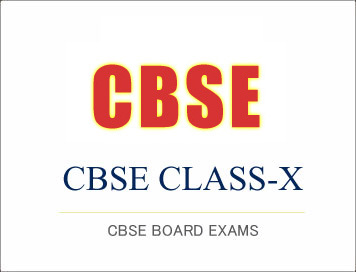CBSE Class-10 Syllabus 2018-19 (English Language and Literature)
Disclaimer: This website is NOT associated with CBSE, for official website of CBSE visit - www.cbse.gov.in
CBSE Class-10 Syllabus 2018-19 (English Language and Literature)
Syllabus :
Background Traditionally, language-learning materials beyond the initial stages have been sourced from literature: prose, fiction and poetry. While there is a trend for inclusion of a wider range of contemporary and authentic texts, accessible and culturally appropriate pieces of literature should play a pivotal role at the secondary stage of education. The English class should not be seen as a place merely to read poems and stories in, but an area of activities to develop the learner’s imagination as a major aim of language study, and to equip the learner with communicative skills to perform various language functions through speech and writing. Objectives The general objectives at this stage are:
• to build greater confidence and proficiency in oral and written communication
• to develop the ability and knowledge required in order to engage in independent reflection and inquiry
• to use appropriate English to communicate in various social settings
• equip learners with essential language skills to question and to articulate their point of view
• to build competence in the different registers of English
• to develop sensitivity to, and appreciation of, other varieties of English, like Indian English, and the culture they reflect
• to enable the learner to access knowledge and information through reference skills (consulting a dictionary / thesaurus, library, internet, etc.)
• to develop curiosity and creativity through extensive reading
• to facilitate self-learning to enable them to become independent learners
• to review, organise and edit their own work and work done by peers
At the end of this stage, learners will be able to do the following:
• give a brief oral description of events / incidents of topical interest
• retell the contents of authentic audio texts (weather reports, public announcements, simple advertisements, short interviews, etc.)
• participate in conversations, discussions, etc., on topics of mutual interest in non-classroom situations
• narrate the story depicted pictorially or in any other non-verbal mode
• respond in writing to business letters, official communications
• read and identify the main points / significant details of texts like scripts of audio-video interviews, discussions, debates, etc.
• write without prior preparation on a given topic and be able to defend or explain the position taken / views expressed in the form of article, speech, or a debate
• write a summary of short lectures on familiar topics by making / taking notes
• write an assessment of different points of view expressed in a discussion / debate
• read poems effectively (with proper rhythm and intonation)
• transcode information from a graph / chart to a description / report and write a dialogue, short story or report
Language Items
In addition to consolidating the grammatical items practised earlier, the courses at the secondary level seek to reinforce the following explicitly:
• sequence of tenses
• reported speech in extended texts
• modal auxiliaries (those not covered at upper primary)
• non-finites (infinitives, gerunds, participles)
• conditional clauses
• complex and compound sentences
• phrasal verbs and prepositional phrases
• cohesive devices
• punctuation (semicolon, colon, dash, hyphen, parenthesis or use of brackets and exclamation mark)
Methods and Techniques
The methodology is based on a multi-skill, activity-based, learner-centred approach. Care is taken to fulfil the functional (communicative), literary (aesthetic) and cultural (sociological) needs of the learner. In this situation, the teacher is the facilitator of learning, S/he presents language items, contrives situations which motivates the child to use English for the purposes of communication and expression. Aural-oral teaching and testing is an integral feature of the teaching-learning process. The electronic and print media could be used extensively. A few suggested activities are:
• Role play
• Simulating real-to-life situations
• Dramatising and miming
• Problem solving and decision making
• Interpreting information given in tabular form and schedule
• Using newspaper clippings
Click Here To Download Full Syllabus
Courtesy: CBSE
